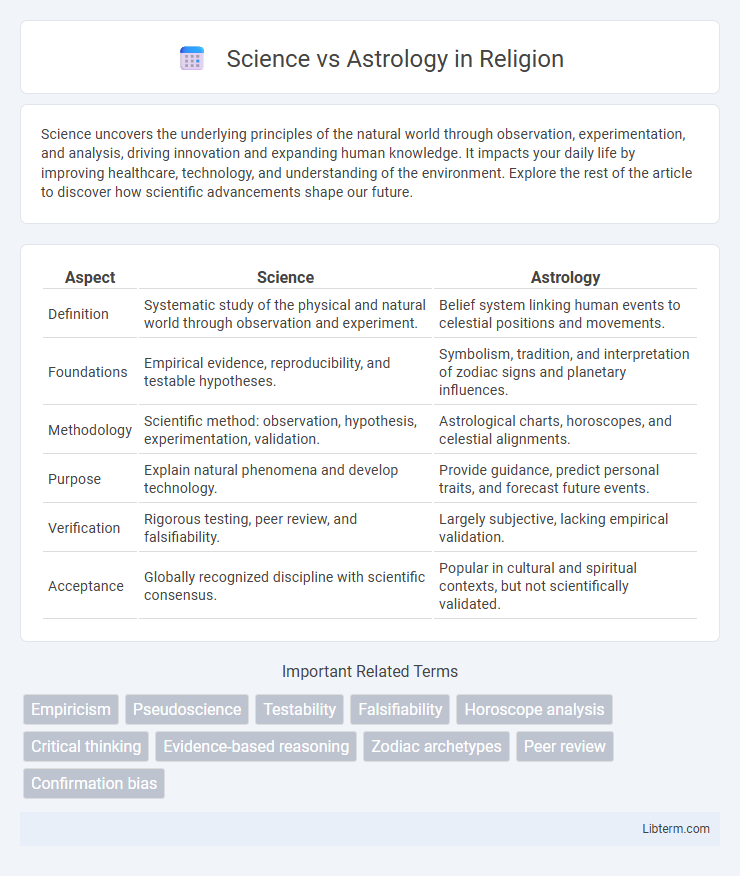Science uncovers the underlying principles of the natural world through observation, experimentation, and analysis, driving innovation and expanding human knowledge. It impacts your daily life by improving healthcare, technology, and understanding of the environment. Explore the rest of the article to discover how scientific advancements shape our future.
Table of Comparison
| Aspect | Science | Astrology |
|---|---|---|
| Definition | Systematic study of the physical and natural world through observation and experiment. | Belief system linking human events to celestial positions and movements. |
| Foundations | Empirical evidence, reproducibility, and testable hypotheses. | Symbolism, tradition, and interpretation of zodiac signs and planetary influences. |
| Methodology | Scientific method: observation, hypothesis, experimentation, validation. | Astrological charts, horoscopes, and celestial alignments. |
| Purpose | Explain natural phenomena and develop technology. | Provide guidance, predict personal traits, and forecast future events. |
| Verification | Rigorous testing, peer review, and falsifiability. | Largely subjective, lacking empirical validation. |
| Acceptance | Globally recognized discipline with scientific consensus. | Popular in cultural and spiritual contexts, but not scientifically validated. |
Introduction: Defining Science and Astrology
Science refers to a systematic enterprise that builds and organizes knowledge through testable explanations and predictions about the universe, relying on empirical evidence and the scientific method. Astrology is a belief system asserting that the positions and movements of celestial bodies influence human behavior and earthly events, lacking empirical support and falsifiability. Understanding the fundamental distinction between science's evidence-based approach and astrology's interpretative framework is essential for evaluating their respective validity and applications.
Historical Context: Origins and Evolution
Science originated from empirical observation and systematic experimentation during the Scientific Revolution of the 16th and 17th centuries, emphasizing evidence-based knowledge. Astrology, with roots tracing back to ancient Mesopotamia around 3000 BCE, evolved as a belief system linking celestial movements to human affairs, rooted in cultural and religious traditions rather than empirical validation. Over centuries, the divergence widened as science adopted rigorous methodologies, while astrology remained grounded in symbolic interpretations and mystical practices.
Scientific Method vs. Astrological Beliefs
The scientific method relies on empirical evidence, experimentation, and falsifiability to validate hypotheses, ensuring objective and reproducible results. Astrological beliefs, however, are based on tradition, symbolism, and interpretations of celestial positions without empirical support or predictive accuracy. This fundamental difference highlights why science demands testable theories, while astrology remains a faith-based practice lacking scientific validation.
Key Principles of Science
Science relies on empirical evidence, testability, and reproducibility as its key principles, ensuring that hypotheses can be systematically verified or falsified through controlled experiments and observations. It operates within the framework of the scientific method, emphasizing objectivity and skepticism to minimize bias and error. In contrast, astrology lacks empirical support and does not adhere to these rigorous standards, relying instead on symbolic interpretations and anecdotal correlations.
Fundamental Claims in Astrology
Astrology claims that the positions and movements of celestial bodies directly influence human behavior and destiny, asserting a cosmic connection between the stars and personal traits or future events. Unlike science, which relies on empirical evidence and testable hypotheses, astrology's fundamental claims lack empirical support and are not grounded in reproducible scientific methodology. The predictive power and personality correlations proposed by astrology often fail rigorous validation, placing it outside the domain of scientific consensus.
Evidence and Testing: A Comparative Analysis
Science relies on empirical evidence obtained through rigorous experimentation and reproducibility to validate hypotheses, ensuring consistent and objective results. Astrology, by contrast, lacks empirical support and fails to produce testable predictions under controlled conditions, making its claims unverifiable by scientific standards. The fundamental difference lies in science's commitment to falsifiability and systematic testing, which astrology does not adhere to, highlighting a clear divergence in evidential reliability.
Role of Skepticism and Critical Thinking
Skepticism and critical thinking play pivotal roles in distinguishing science from astrology, emphasizing evidence-based evaluation and empirical validation that astrology lacks. Scientific inquiry relies on testable hypotheses and reproducible results, while astrology depends on unproven correlations and anecdotal claims. Cultivating critical thinking skills enables individuals to question assumptions and prioritize credible scientific methodologies over unsupported astrological beliefs.
Public Perception and Cultural Influence
Public perception of science emphasizes empirical evidence and reproducibility, making it the foundation of modern technology and medicine, while astrology gains cultural influence through historical traditions and its appeal to personal insight. Scientific skepticism challenges astrology's lack of testable hypotheses, yet astrology persists in popular culture due to its symbolic narratives and emotional resonance. Media representation and social contexts shape how both science and astrology are valued, often blending scientific advances with astrological practices in contemporary society.
Scientific Critiques of Astrology
Scientific critiques of astrology emphasize its lack of empirical evidence and failure to adhere to the principles of the scientific method. Studies consistently show no correlation between astrological predictions and actual outcomes, undermining astrology's claims of accuracy. The reliance on vague, generalized statements and confirmation bias further discredits astrology within the scientific community.
Conclusion: The Ongoing Debate
Science relies on empirical evidence and reproducible results, firmly establishing facts through rigorous experimentation and analysis. Astrology, rooted in ancient beliefs, lacks scientific validation and depends on interpretations of celestial positions without measurable proof. The ongoing debate persists as science continues to advance knowledge, while astrology maintains cultural and psychological significance for many.
Science Infographic

 libterm.com
libterm.com